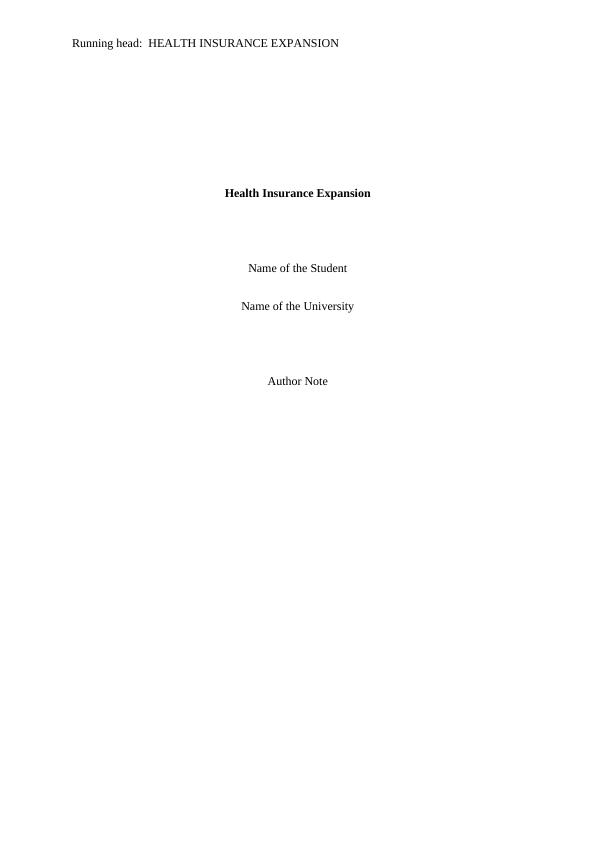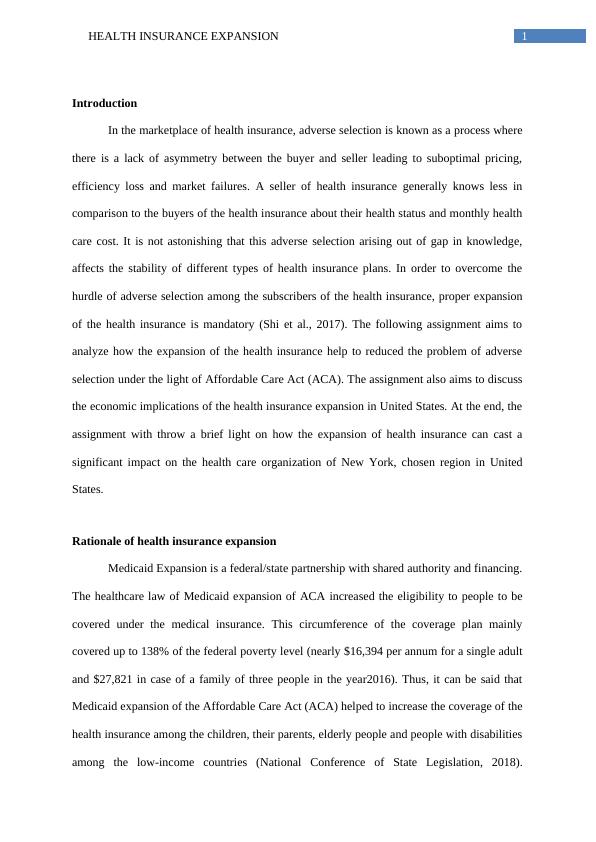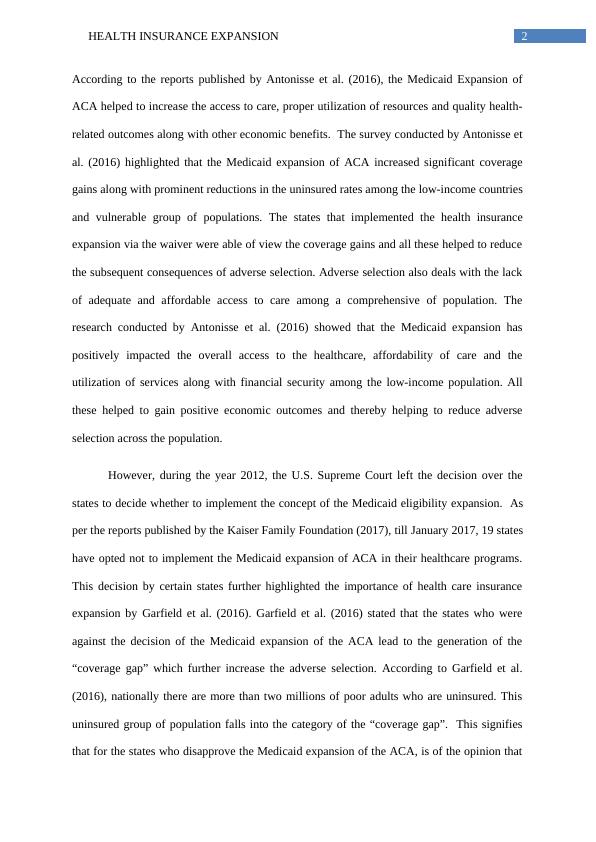Health Insurance Expansion: Impact on Adverse Selection and Economic Implications
Added on 2023-06-11
9 Pages2309 Words446 Views
Running head: HEALTH INSURANCE EXPANSION
Health Insurance Expansion
Name of the Student
Name of the University
Author Note
Health Insurance Expansion
Name of the Student
Name of the University
Author Note

1HEALTH INSURANCE EXPANSION
Introduction
In the marketplace of health insurance, adverse selection is known as a process where
there is a lack of asymmetry between the buyer and seller leading to suboptimal pricing,
efficiency loss and market failures. A seller of health insurance generally knows less in
comparison to the buyers of the health insurance about their health status and monthly health
care cost. It is not astonishing that this adverse selection arising out of gap in knowledge,
affects the stability of different types of health insurance plans. In order to overcome the
hurdle of adverse selection among the subscribers of the health insurance, proper expansion
of the health insurance is mandatory (Shi et al., 2017). The following assignment aims to
analyze how the expansion of the health insurance help to reduced the problem of adverse
selection under the light of Affordable Care Act (ACA). The assignment also aims to discuss
the economic implications of the health insurance expansion in United States. At the end, the
assignment with throw a brief light on how the expansion of health insurance can cast a
significant impact on the health care organization of New York, chosen region in United
States.
Rationale of health insurance expansion
Medicaid Expansion is a federal/state partnership with shared authority and financing.
The healthcare law of Medicaid expansion of ACA increased the eligibility to people to be
covered under the medical insurance. This circumference of the coverage plan mainly
covered up to 138% of the federal poverty level (nearly $16,394 per annum for a single adult
and $27,821 in case of a family of three people in the year2016). Thus, it can be said that
Medicaid expansion of the Affordable Care Act (ACA) helped to increase the coverage of the
health insurance among the children, their parents, elderly people and people with disabilities
among the low-income countries (National Conference of State Legislation, 2018).
Introduction
In the marketplace of health insurance, adverse selection is known as a process where
there is a lack of asymmetry between the buyer and seller leading to suboptimal pricing,
efficiency loss and market failures. A seller of health insurance generally knows less in
comparison to the buyers of the health insurance about their health status and monthly health
care cost. It is not astonishing that this adverse selection arising out of gap in knowledge,
affects the stability of different types of health insurance plans. In order to overcome the
hurdle of adverse selection among the subscribers of the health insurance, proper expansion
of the health insurance is mandatory (Shi et al., 2017). The following assignment aims to
analyze how the expansion of the health insurance help to reduced the problem of adverse
selection under the light of Affordable Care Act (ACA). The assignment also aims to discuss
the economic implications of the health insurance expansion in United States. At the end, the
assignment with throw a brief light on how the expansion of health insurance can cast a
significant impact on the health care organization of New York, chosen region in United
States.
Rationale of health insurance expansion
Medicaid Expansion is a federal/state partnership with shared authority and financing.
The healthcare law of Medicaid expansion of ACA increased the eligibility to people to be
covered under the medical insurance. This circumference of the coverage plan mainly
covered up to 138% of the federal poverty level (nearly $16,394 per annum for a single adult
and $27,821 in case of a family of three people in the year2016). Thus, it can be said that
Medicaid expansion of the Affordable Care Act (ACA) helped to increase the coverage of the
health insurance among the children, their parents, elderly people and people with disabilities
among the low-income countries (National Conference of State Legislation, 2018).

2HEALTH INSURANCE EXPANSION
According to the reports published by Antonisse et al. (2016), the Medicaid Expansion of
ACA helped to increase the access to care, proper utilization of resources and quality health-
related outcomes along with other economic benefits. The survey conducted by Antonisse et
al. (2016) highlighted that the Medicaid expansion of ACA increased significant coverage
gains along with prominent reductions in the uninsured rates among the low-income countries
and vulnerable group of populations. The states that implemented the health insurance
expansion via the waiver were able of view the coverage gains and all these helped to reduce
the subsequent consequences of adverse selection. Adverse selection also deals with the lack
of adequate and affordable access to care among a comprehensive of population. The
research conducted by Antonisse et al. (2016) showed that the Medicaid expansion has
positively impacted the overall access to the healthcare, affordability of care and the
utilization of services along with financial security among the low-income population. All
these helped to gain positive economic outcomes and thereby helping to reduce adverse
selection across the population.
However, during the year 2012, the U.S. Supreme Court left the decision over the
states to decide whether to implement the concept of the Medicaid eligibility expansion. As
per the reports published by the Kaiser Family Foundation (2017), till January 2017, 19 states
have opted not to implement the Medicaid expansion of ACA in their healthcare programs.
This decision by certain states further highlighted the importance of health care insurance
expansion by Garfield et al. (2016). Garfield et al. (2016) stated that the states who were
against the decision of the Medicaid expansion of the ACA lead to the generation of the
“coverage gap” which further increase the adverse selection. According to Garfield et al.
(2016), nationally there are more than two millions of poor adults who are uninsured. This
uninsured group of population falls into the category of the “coverage gap”. This signifies
that for the states who disapprove the Medicaid expansion of the ACA, is of the opinion that
According to the reports published by Antonisse et al. (2016), the Medicaid Expansion of
ACA helped to increase the access to care, proper utilization of resources and quality health-
related outcomes along with other economic benefits. The survey conducted by Antonisse et
al. (2016) highlighted that the Medicaid expansion of ACA increased significant coverage
gains along with prominent reductions in the uninsured rates among the low-income countries
and vulnerable group of populations. The states that implemented the health insurance
expansion via the waiver were able of view the coverage gains and all these helped to reduce
the subsequent consequences of adverse selection. Adverse selection also deals with the lack
of adequate and affordable access to care among a comprehensive of population. The
research conducted by Antonisse et al. (2016) showed that the Medicaid expansion has
positively impacted the overall access to the healthcare, affordability of care and the
utilization of services along with financial security among the low-income population. All
these helped to gain positive economic outcomes and thereby helping to reduce adverse
selection across the population.
However, during the year 2012, the U.S. Supreme Court left the decision over the
states to decide whether to implement the concept of the Medicaid eligibility expansion. As
per the reports published by the Kaiser Family Foundation (2017), till January 2017, 19 states
have opted not to implement the Medicaid expansion of ACA in their healthcare programs.
This decision by certain states further highlighted the importance of health care insurance
expansion by Garfield et al. (2016). Garfield et al. (2016) stated that the states who were
against the decision of the Medicaid expansion of the ACA lead to the generation of the
“coverage gap” which further increase the adverse selection. According to Garfield et al.
(2016), nationally there are more than two millions of poor adults who are uninsured. This
uninsured group of population falls into the category of the “coverage gap”. This signifies
that for the states who disapprove the Medicaid expansion of the ACA, is of the opinion that

End of preview
Want to access all the pages? Upload your documents or become a member.
Related Documents
Affordable Care Actlg...
|4
|819
|204
Analysis of Healthcare Policy and Medicaid Expansion under ACAlg...
|9
|1820
|208
Affordable Health Care Act and Medicaid Expansionlg...
|17
|1605
|184
Projected Financial Impact of The Affordable Care Act (ACA)lg...
|6
|1070
|231
The Role of Government in the U.S. Health Care Systemlg...
|6
|1512
|494
Importance of Health Insurance: Benefits, Impacts, and Penaltieslg...
|4
|2372
|73
